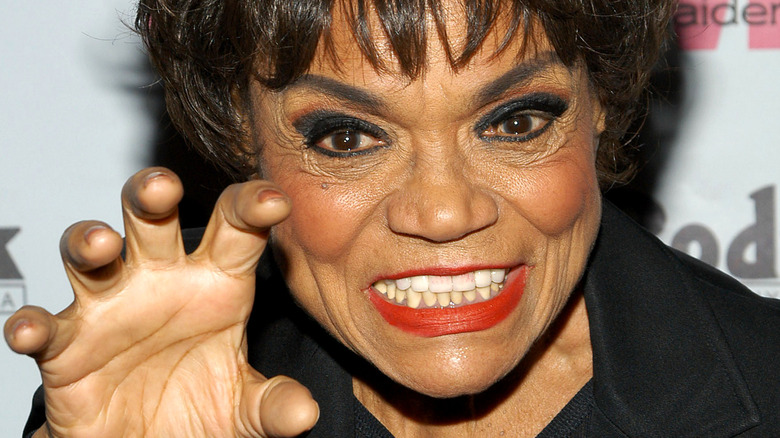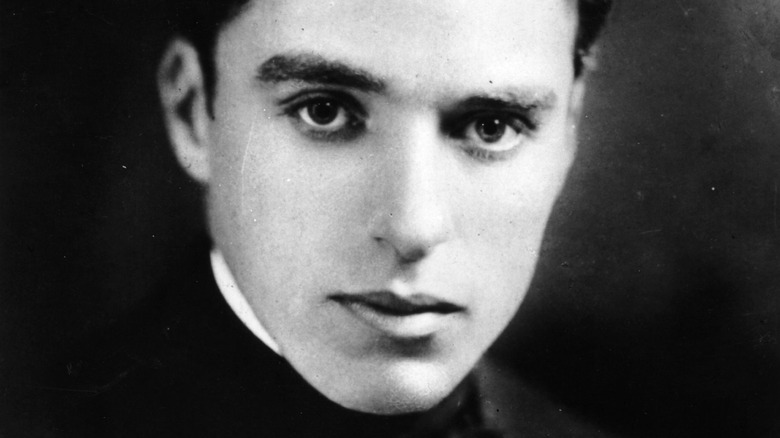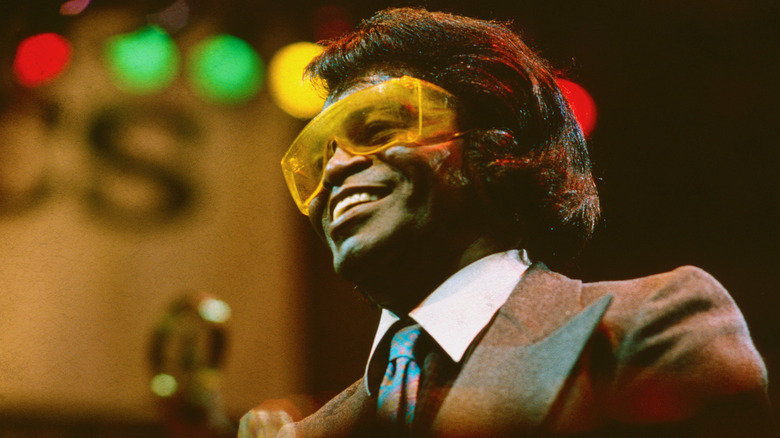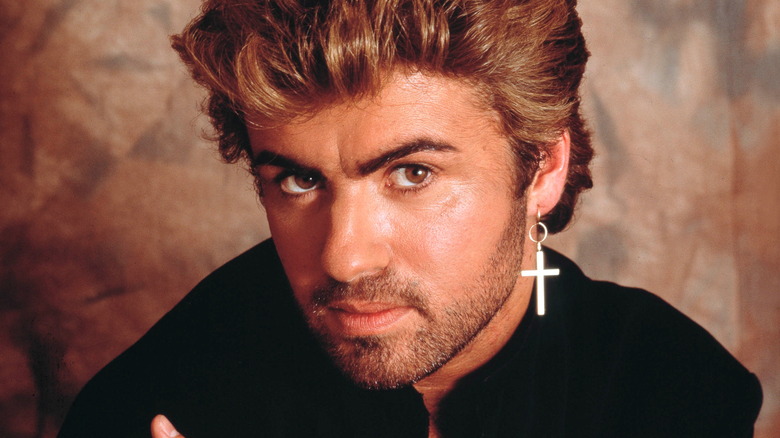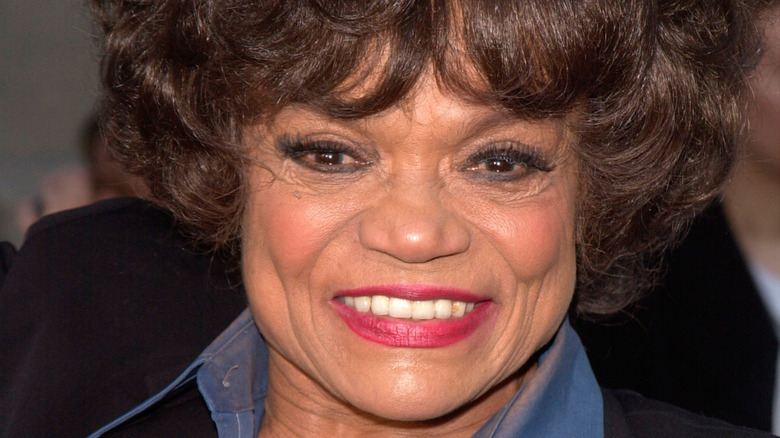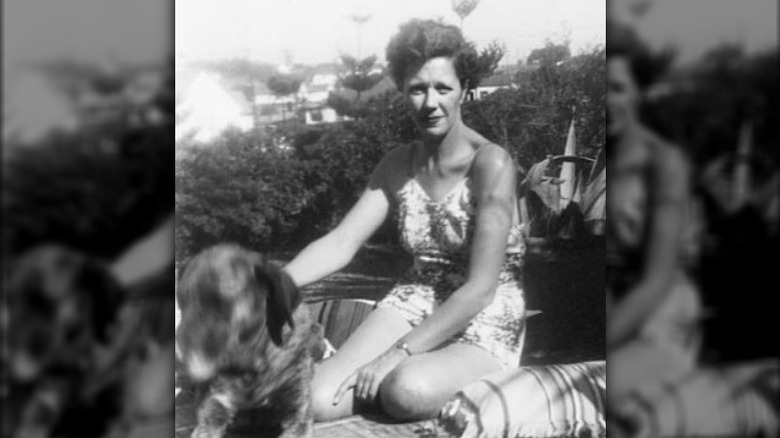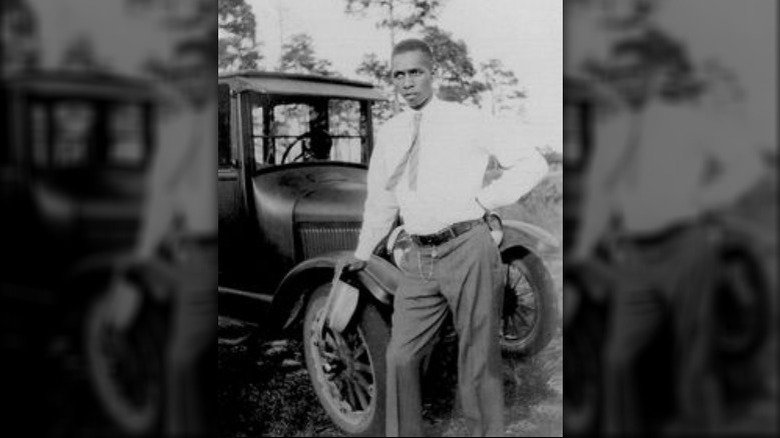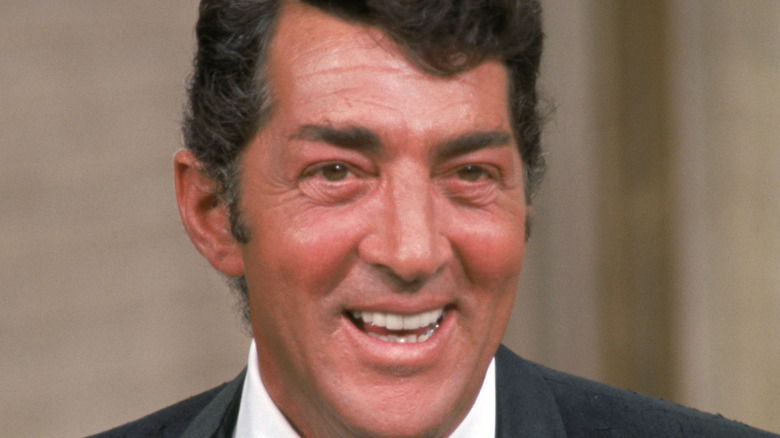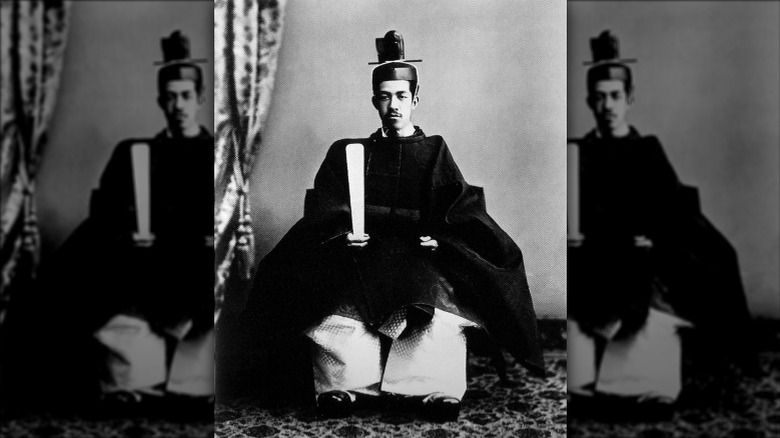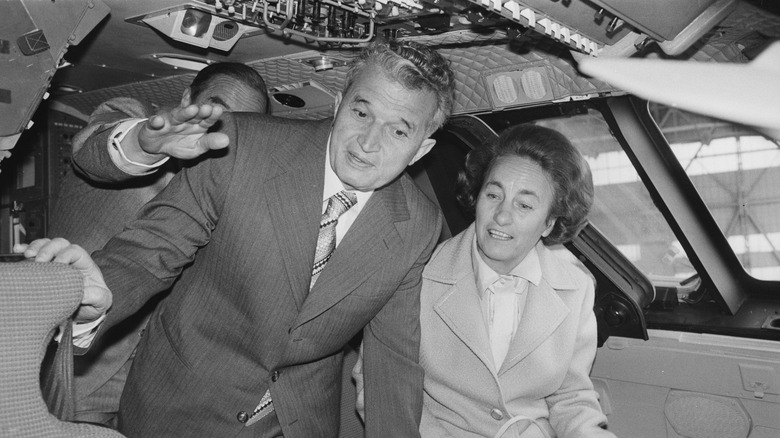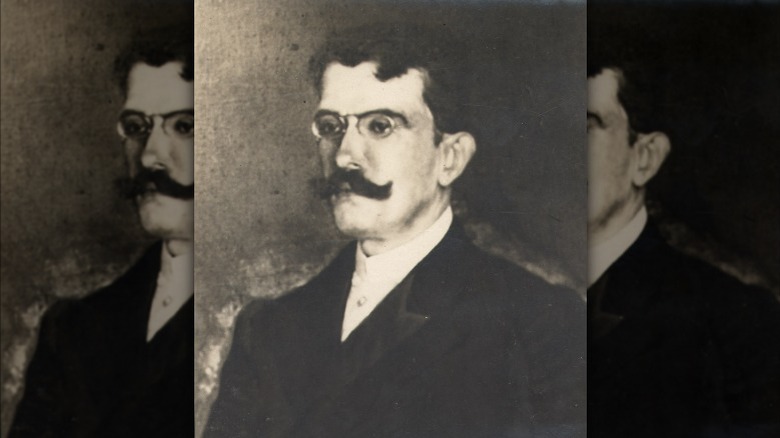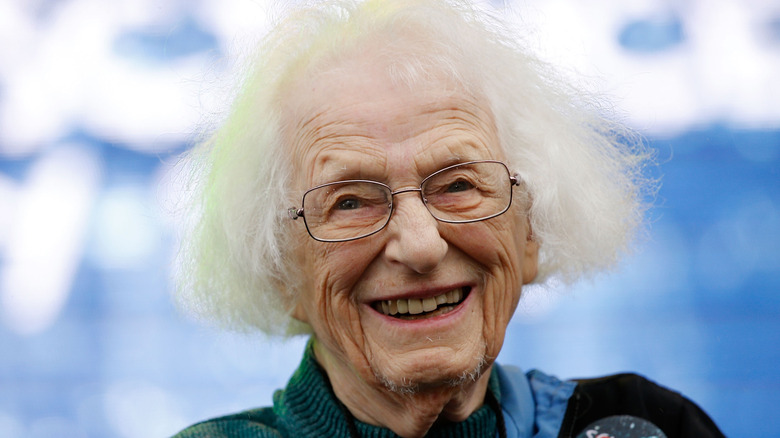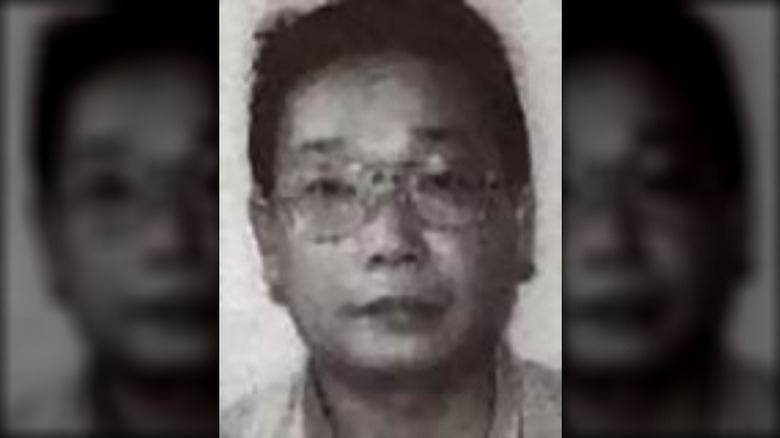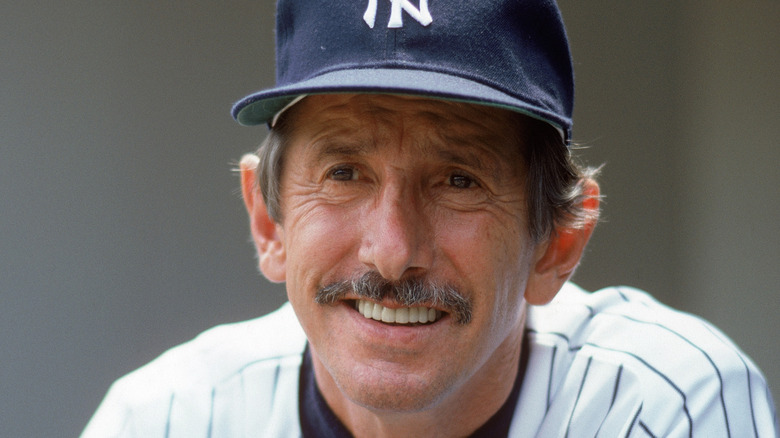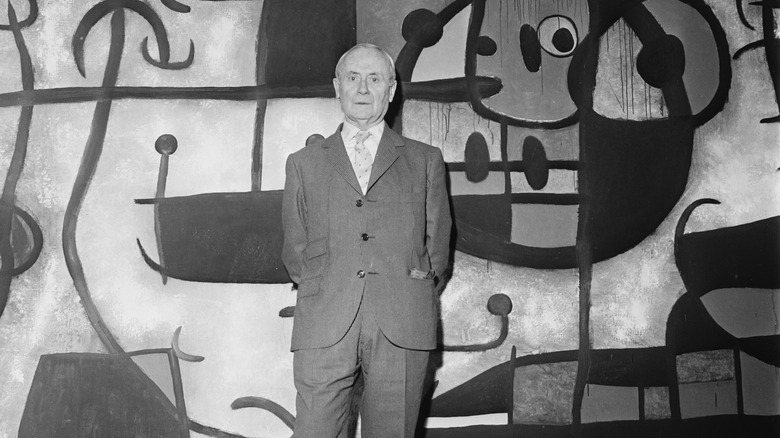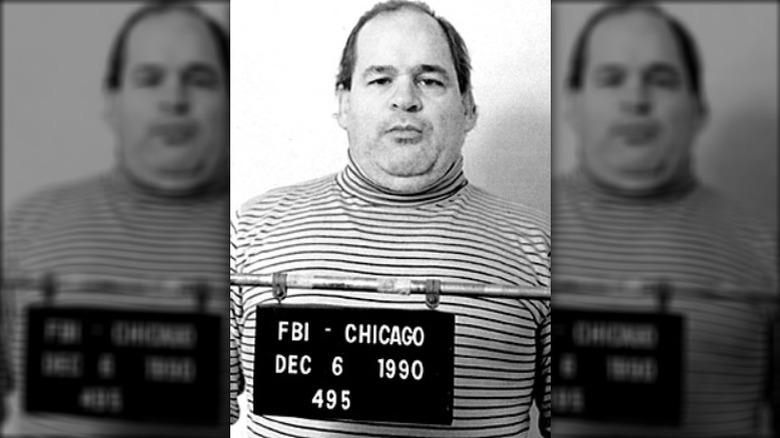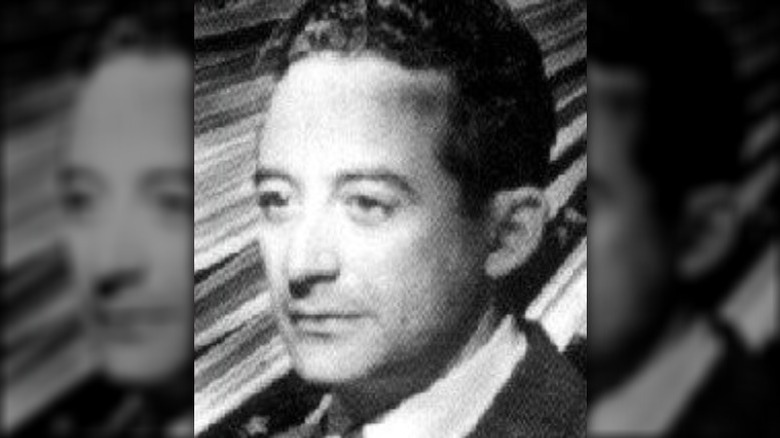Famous People Who Died On Christmas
The holidays are, as the lyric goes, "the most wonderful time of the year." It's a time when many people celebrate various religious and secular holidays, look forward to new beginnings, and spend time with family and friends. Plus, one way or another, a lot of people get presents and eat a ton of food, so what's not to love?
All that cheer can be hard to miss out on, and no one wants to ruin anyone else's holiday. But time waits for no man ... to eat a fourth helping of honey glazed ham. Death doesn't take Christmas off, which means that sadly, for some families, Christmas will be a day when they lose a loved one, and every Christmas after that will be tinged with the sadness of knowing it's the anniversary of their death.
And since death is the great equalizer, even the rich, famous, and/or powerful can find themselves meeting their maker at a rather inconvenient time. Here are famous people who died on Christmas Day.
Charlie Chaplin
In an obituary published two days after he died on Christmas Day in 1977, Variety called Charlie Chaplin (or Sir Charlie as he was in the last seven years of his life, having been knighted by Queen Elizabeth II in 1970) "the greatest comic actor in motion picture history." Known for his roles in silent films, especially his character the Little Tramp, Chaplin had an eventful life, including winning one Oscar in 1928 and receiving another in 1972 for his lifetime achievements in film. But he also fell foul of the communist witch hunt craze that swept the U.S. in the 1950s.
After that, Chaplin moved to Switzerland, which is where he died, surrounded by family, on Christmas morning. "My husband died peacefully in his sleep during the night," his widow Oona said. "The funeral will be private and restricted to the immediate family." She added, "All the presents were under the tree. Charlie gave so much happiness and although he had been ill for a long time it is so sad that he should have passed away on Christmas Day." Chaplin's health issues included needing a wheelchair and oxygen tank, as well as losing his hearing and sight, and having increasing trouble speaking. Despite this, his doctor, Henri Perrier, explained that in the end, it was nothing dramatic that killed him: "Sir Charles died peacefully in his sleep from old age."
He was buried in a Swiss cemetery but would not rest for long. According to History, a few months later graverobbers stole Charlie Chaplin's body and held it for ransom.
James Brown
The Godfather of Soul James Brown managed to make almost as many headlines in death as he did in life. That's because things that happened – or didn't happen – right before and after he died on Christmas Day in 2006 were a bit odd. There might be perfectly reasonable explanations for everything, but without knowing them, people started asking questions. Even a decade after he died, the doctor who actually signed Brown's death certificate thought something was weird. Dr. Marvin Crawford told CNN, "He changed too fast. He was a patient I would never have predicted would have coded ... But he died that night, and I did raise that question: What went wrong in that room?"
On the surface, it doesn't seem weird that the 73-year-old Brown would die while in the hospital, considering he had prostate cancer and diabetes. Plus, once he was admitted, Dr. Crawford diagnosed a recent small heart attack and "early congestive heart failure." But under treatment, Crawford says Brown started to really improve. So him suddenly dying when things were looking up was definitely unexpected to this medical expert.
And yet, no autopsy was performed. Brown's daughter is mum on why, telling an interviewer, "I had my own personal reasons for not doing an autopsy. I don't want to talk about that." Later she reiterated to CNN, "I don't need an autopsy. That was the day that God chose to take him." Perhaps God wanted James Brown to perform at Jesus' birthday party.
George Michael
In any store, you can't escape Wham!'s classic "Last Christmas" playing over the speakers on a seemingly endless loop for at least three month a year. So it's ironic that singer George Michael died on Christmas Day in 2016. He was discovered by his boyfriend of five years, Fadi Fawas, who told the Telegraph, "We were supposed to be going for Christmas lunch. I went round there to wake him up and he was just gone, lying peacefully in bed ... George was looking forward to Christmas, and so was I. Now everything is ruined." The official cause of death was "dilated cardiomyopathy with myocarditis and fatty liver." George Michael's ex-boyfriend Kenny Goss said, "I think his body just gave up. All these years, it was just weak."
Neighbors said they had seen the singer getting ready for the holidays, but he hadn't interacted with them, with one reporting the local rumor was "the last time he was seen was watching the torchlight procession on Christmas Eve from the window" and another noting "He came to the midnight service last year, but he didn't come this year. He decorated the garden with Christmas lights so we knew he was there but we didn't see him." It was thought George Michael spent his last night either alone or in the company of his housekeeper.
In a double tragedy for George Michael's family, Rolling Stone says his sister Melanie Panayiotou died suddenly exactly three years later to the day, making Christmas an especially sad time for the siblings' loved ones.
Eartha Kitt
Eartha Kitt might have been compared to a cat by the press originally because of her last name, but it was an image she played into. Her obituary in the New York Times reported that she'd started her long career in the 1940s as a dancer, before tackling Broadway, Hollywood, and the music industry. She succeeded at building a great body of work in all of them.
But by the time she was 81, Kitt was suffering from advanced colon cancer. She died at her home on Christmas Day in 2008, with her daughter Kitt Shapiro by her side.
While that seems like the best death one could hope for, colon cancer is not a fun way to go, and when Shapiro gave an interview to Mommy Noire in 2013, she made her mother's death sound horrible. "I was with her when she died. She left this world literally screaming at the top of her lungs." Shapiro seemed to mean this as a good, or at least a characteristic thing, and she continued, "Up until the last two days, she was still moving around. The doctor told us she will leave very quickly and her body will just start to shut down. But when she left, she left the world with a bang, she left it how she lived it. She screamed her way out of here, literally. I truly believe her survival instincts were so part of her DNA that she was not going to go quietly or willingly."
Helen Joseph
The most famous leaders of the anti-apartheid fight in South Africa are, rightly, Black. But they had some notable compatriots who practiced true allyship. One of the most dedicated was Helen Joseph. Encyclopedia.com's list of her anti-apartheid actions is far too long to include here, but rest assured she was charged with high treason, spent two 5-year terms under house arrest, was "banned" twice, and spent four months in jail to avoid testifying against Winnie Mandela. In fact, the New York Times says Winnie considered Joseph to be "family," and Nelson Mandela wrote to Joseph from his prison cell on Robben Island.
Joseph was also declared a "listed person," which was supposed to mean she wasn't allowed to be quoted in the press, but she continued speaking out. "You can't silence yourself," she told one interviewer. While under house arrest, she explained, she was not allowed to "leave the magisterial area of Johannesburg, or be in any Black area, or factory, or communicate with any banned or listed person. Nor could any of my friends visit me in my home, or even walk down my garden path, nor could I attend any gatherings, social or political."
Despite having cancer and a heart attack, Joseph held on long enough to see Nelson Mandela finally released from prison in 1990. And in March 1992, just shy of her 86th birthday, Joseph voted in the referendum to end apartheid. However, she died on Christmas Day of that year, so she did not live to see Mandela become president of South Africa.
Harry T. Moore
There were innumerable horrific things done to Black people during their fight for civil rights, but even with how long that list is, blowing up a house with the owners inside on Christmas Day in 1952 – which was also their 25th wedding anniversary – has to be notable for its layers of evil.
While both Harry T. and Harriette Moore would die because of the blast, Harriette held on until January 3, meaning she doesn't technically qualify for this list. But make no mistake, while Harry died on Christmas Day, Harriette was really murdered that day as well. The two were targets for their work for the Florida chapter of the N.A.A.C.P., which they'd founded. The Zinn Education Project says Harry was "the most hated Black man in Florida." But Harry knew what he was doing. He told his mother, who was visiting him the Christmas he died, not to be concerned for his safety: "Every advancement comes by way of sacrifice. What I am doing is for the benefit of my race."
After the terrorist attack that killed Harry, Langston Hughes wrote the "Ballad of Harry T. Moore, " which included the lines "And this he says, our Harry Moore / As from the grave he cries: / No bomb can kill the dreams I hold, / For freedom never dies!"
If you or a loved one has experienced a hate crime, contact the VictimConnect Hotline by phone at 1-855-4-VICTIM or by chat for more information or assistance in locating services to help. If you or a loved one are in immediate danger, call 911.
Dean Martin
Dean Martin is synonymous with a certain type of midcentury cool: dressed to the nines, drink in hand, crooning away in Las Vegas. It was an unexpected career path, according to his obituary in the Washington Post, since he dropped out of high school before trying to be a boxer and then getting a job as a steelworker. But Dean Martin's work with Jerry Lewis and the Rat Pack made him a household name. Still, the image he portrayed on stage wasn't his actual personality. For one, according to his daughter, he was drinking apple juice instead of whiskey. She says, "He was so different from what everybody thought he was. There was no one who could do Dean Martin better than Dean Martin."
Martin died on Christmas Day in 1995 at the age of 78. Heavy records that he'd been fighting two major health issues for years. His kidney problems had forced him into retirement shortly before he died, but it was complications from lung cancer and emphysema that would kill him. (The drinks he had on stage might have been fake, but the cigarettes were real.)
Frank Sinatra was, of course, very affected by his friend's death. "Dean was my brother — not through blood, but through choice," Sinatra said. "Good times and bad, we were there for each other. Our friendship has traveled down many roads over the years and there will always be a special place in my heart and soul for Dean."
Yoshihito
In 1924, a Japanese university polled 3,500 of the country's factory workers, asking them "Who do you think is the greatest figure in history?" The book "Enigma of the Emperors: Sacred Subservience in Japanese History" records that the winner of the poll was Japan's then-emperor, Yoshihito, who destroyed the competition, beating out even the Buddha 739 votes to 188.
Yoshihito had a stroke in 1925, and a year later his condition was even worse. When the Japanese people were told their beloved emperor was gravely ill with pneumonia, the country stopped completely. Some people completed suicide, while most just prayed for his recovery. "Enigma of the Emperors" calls this "emotional attachment" the people felt for the emperor to be "extraordinary," especially considering, as Facing History and Ourselves explains, Yoshihito had been mentally unstable since contracting meningitis as a kid. He became emperor in 1912, but by 1919 he was too unwell to perform any official duties, and two years later he stopped going out in public completely.
Yoshihito (who is posthumously known as Taishō) died on Christmas Day in 1926, aged 47. One writer recorded how the details of his final weeks ruined the mystic of the emperor: "The newspapers told us that the emperor suffered from uremic poisoning and that his august countenance had turned muddy purple ... our sovereign is revered as a god, and to tell us that he has died a victim of uremic poisoning shatters the poetry ... Why must these facts about appetite and defecation be made public as the royal death approaches?"
Nicolae and Elena Ceaușescu
While Nicolae Ceaușescu's name is more famous than his wife Elena's, the Independent says they ruled Romania "almost in tandem" for two and half decades. Was theirs a happy rule, a husband-and-wife team taking care of their country like loving parents? Um, no. It was more of the cruel dictatorship variety. Their ends came the way those of many dictators do, in a hail of bullets, put to death by their own people. It was Christmas Day 1989.
One factory worker who was 33 at the time witnessed Nicolae Ceaușescu's speech that brought the dictatorship down. He said at that moment, the people had had enough: "This man had ruled every aspect of our lives since before we could remember. And none of it had been good whatever lies he had spun. I was there when the people turned." A quick (and questionable) trial gave the inevitable verdict, and the Ceaușescus were immediately taken to be killed by firing squad.
As for the executions taking place on Christmas Day in a country that was predominantly Christian? One army general explained that he knew "It was not just, but it was necessary," because "If we had left it to the people of Bucharest there would have been lynchings." The people themselves have mixed views. One said it was "All wrong. Shameful. We were glad to see them go but shooting them on Christmas Day could have made martyrs of them." On the other hand, another woman believed "Christianity owed him nothing."
Raúl Pompéia
The 19th century Brazilian author Raúl Pompéia suffered far too much in his short life. Encyclopedia.com records that he was raised by exacting parents who expected a lot of him. He was eventually sent to boarding school, but this was out of the frying pan and into the fire, since both teachers and students at the school made his life hell, through "neglect and abuse." Adulthood was no better, with Pompéia suffering from rumors about his sexuality (being gay in heavily Catholic Brazil in the 1800s would have been extremely difficult), engaging in a feud that almost ended in a duel, and being reviled for his political beliefs.
While Pompéia is said to have been a nice guy, this terrible treatment from those around him led to serious depression, his brain filled with morbid thoughts and existential crises. He took all this and channeled it, and his life experiences, into his only book, "The Athenaeum." This single work had a huge effect on the literary world, influencing greats including Sartre. Encyclopedia.com calls "The Athenaeum" a "realist-naturalist, existentialist masterpiece."
But Pompéia's life kept getting worse, with friends turning on him, as well as losing his job. In the introduction to a translation of "The Athenaeum," Cesar Braga-Pinto writes that Raúl Pompéia died by suicide on Christmas Day in 1895 at 1pm, which he'd previously written was "the hour of death."
If you or anyone you know is having suicidal thoughts, please call the National Suicide Prevention Lifeline at 1-800-273-TALK (8255).
Nancy Roman
The Hubble telescope was groundbreaking when it was launched in 1990, literally space age technology. And while STEM careers were dominated by men, one of the key people who helped make the famous satellite a reality was a woman, Nancy Grace Roman. In fact, she was so important to the project that she'd been dubbed "the mother of Hubble," according to her obituary in the Washington Post.
Unsurprisingly, Roman faced an uphill battle getting the education, and then career, that she wanted. "I was told from the beginning that a woman could not be an astronomer," she said in a video released by NASA (via Space) shortly before she died. Recalling an interaction with her high school guidance counselor, Roman said, "She looked down her nose at me and sneered, 'What lady would take mathematics instead of Latin?'" When getting her PhD, her thesis advisor refused to talk to her for six months. But Roman prevailed, joining NASA as one of the first employees after it was created, as the first ever chief of astronomy. "She made it possible to get early telescopes up [into space] to learn what needed to be learned," science historian Bob Zimmerman said. "As soon as that technology started to mature, she was pushing for the design work. Her hard-nosed nature helped get the telescope built."
Roman died on Christmas Day in 2018, aged 93, but not before living to see herself as a minifig in Lego's Women of NASA set.
Hiroaki Hidaka
While only a very small fraction of Japan's residents are Christian, the Christmas holiday has still managed to make its way into their culture. Christmas is seen as a holiday for friends, and the BBC reports that since the 1970s it's been heavily associated with KFC, with many families partaking in the fast food as part of their much smaller but still notable Christmas celebrations.
So while it might not have been as shocking as it would be if it happened in the U.S., it was still considered a bit uncool when the Japanese government executed four men on Christmas Day in 2006. Especially because of why they did it. The Japan Times explains that the country hadn't executed any criminals in over a year, and, as one unnamed source from the Justice Ministry explained, "We absolutely wanted to avoid ending the year with zero executions." But one Christian anti-death penalty activist was not happy of the choice of day. "It was such an insensitive act," Makoto Suzuki told the Times of London. "Christmas is the day to reaffirm humanity."
One of the men who were executed that day was Hiroaki Hidaka, a notorious serial killer. He'd been on death row since 2000, when he was convicted of murdering three women and one 16-year-old girl, whom he'd picked up in his taxi before strangling her, robbing her, and dumping her body in the wilderness. Like all of Japan's death row inmates, Hidaka was given no warning that he was about to be executed until right before he was hanged.
Billy Martin
When Yankees legend Billy Martin died in a car crash on Christmas Day in 1989, aged 61, there was an immediate outpouring of sympathy from the baseball fraternity. Lou Piniella, who was friends with Martin and had played for him in the past, told the New York Times that Martin had lots of plans for the future: "He was going to be more involved with the team. He was going to go to more Yankee games, help evaluate the team in spring training. He was enthused about doing these things. I got the feeling he was looking forward to managing one more time.”
Yankees owner George Steinbrenner said he had spoken to Martin just the week before and they had discussed the upcoming holiday. ”He was excited about it,” Steinbrenner said. ”He talked about how when he was a kid at Christmas, he didn't do much.”
Martin's death was especially tragic. Sportscasting reports that Martin and his friend Bill Reedy were coming home from a bar early on Christmas morning when their car was in a single-vehicle accident. It's not clear who was driving when they crashed, since Reedy survived but changed his story, saying he's been trying to protect Martin, who had serious issues with alcohol abuse his whole life. Reedy was eventually convicted of driving over the limit.
If you or anyone you know is struggling with addiction issues, help is available. Visit the Substance Abuse and Mental Health Services Administration website or contact SAMHSA's National Helpline at 1-800-662-HELP (4357).
Joan Miro
When he died on Christmas Day in 1984, the Spanish artist Joan Miro was already a legend. The New York Times called him "an artist of the first rank" who "left an ineffaceable mark upon his century," while the Washington Post said he was "one of the great masters and creators of modern art" and gave him credit for connecting the abstract art movements from early in the 1900s to the mid-20th century, influencing the work of greats like Jackson Pollock and Mark Rothko. By the time of his death, Miro already had works displayed in some of the best museums in the world, including New York's MoMA and the Guggenheim, as well as the Miro Foundation in Barcelona, which only showcased his work.
This was perhaps not surprising, since Joan Miro made it to the ripe old age of 90. In the end, Miro's passing was not dramatic. He'd been having health issues you'd expect of someone in their 10th decade, including "heart and lung ailments," and only two weeks before he'd been in the hospital because of difficulty breathing, and had been confined to his bed since then.
But in his old age, Miro was still thinking about the future. ”It's the young people who interest me, and not the old dodos,” he said. ”If I go on working, it's for the year 2000, and for the people of tomorrow.” (Yes, the year 2000 used to be a time that seemed impossibly far away and exotic, instead of what Gen Z considers basically cavemen days.)
Frank Calabrese Sr.
There are plenty of mobsters who are just low-level toughs, but Frank Calabrese Sr. became infamous as a hitman for the Chicago mafia. The Chicago Tribune says he was eventually convicted of 10 disturbing murders, where he'd strangle his victims with a rope before cutting their throats. Even his own brother ended up testifying against Calabrese. A friend of their family, Frank Coconate, called Calabrese a "unique individual” who was a "a throwback gangster" and "strong as a bull." Calabrese's lawyer, the fabulously nicknamed Joseph "Shark" Lopez, said his client was "quick-witted, smart and street-savvy. Always very upbeat." But he obviously wasn't a good guy, and Coconate also said the mobster was "a great manipulator. He was very charming. That's what made him dangerous.”
When you're convicted of murdering almost a dozen people, it's pretty much guaranteed you are going to die in jail, which Calabrese did on Christmas Day in 2012. His lawyer explained that this wasn't exactly unexpected. "Last I spoke with him a little over a year ago, he was a sick man," Lopez said. "He was on about 17 different medications. But always a strong-willed individual."
As for Frank Calabrese dying on Christmas Day, Lopez thought it was "odd," especially since the mobster was a religious guy, so the holiday meant a lot to him. (The parts of the Bible where God tells people not to murder must have escaped his notice somehow.) Lopez revealed, "He always talked about how much he loved spending Christmas with his family. It was his favorite holiday of the year."
Xavier Villaurrutia
If you don't manage to win a Nobel Prize in your lifetime, surely the next best thing is for someone who did win to write a book about you. So it is with the Mexican poet Xavier Villaurrutia. While he's not a household name outside his own country, the Los Angeles Times reports that the Nobel laureate Octavio Paz wrote a book about how awesome Villaurrutia and his work were. Paz lays the praise on thick, saying Villaurrutia "belongs to the class of poets and of men we need most today: Those who neither affirm nor negate, but who doubt and question themselves." But even Paz has to admit that Villaurrutia has a more niche fan base, which Paz sees as a good thing. "Villaurrutia's glory is secret, like his poetry," he wrote. "I don't regret this and neither would he. He asked for nothing more than the fervent admiration of a few. In modern times poetry is not, nor can it be, more than an underground cult, a ceremony in the catacomb."
What Villaurrutia was especially good at was reflecting on dying. His poetry includes haunting lines like "Death always takes the shape / of our bedroom" and "it may just be possible / to live after having died." His magnum opus is the work "Nostalgia for Death." While he's best known for his poetry, he actually wrote more in other mediums, like plays.
Villaurrutia died on Christmas Day in 1950, aged 47.
